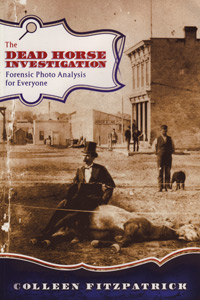 Still looking for the perfect gift for your favorite genealogists, or perhaps a little something for your own genealogy library, then here is a book for you:
Still looking for the perfect gift for your favorite genealogists, or perhaps a little something for your own genealogy library, then here is a book for you:
When it comes to your ancestor’s photographs, has the fat lady sung her last? Do you feel that there is little to nothing more you can gain from examining these visual records? If you ask Colleen Fitzpatrich these questions she will tell you absolutely not. She will ask you questions like:
- Have you ever considered using an ultraviolet light to date your photos?
- What does it mean if you find a photo on the back of an old picture?
- Can you spot a fake?
- Can you tell what camera was used to take a picture of someone posing in his BVDs?
While very few people will work as photo experts, everyone can learn the basic investigation techniques to work like one. Through some tricks, creative thinking, and a developed eye, anyone can learn to expertly evaluate a photograph. In The Dead Horse Investigation: Forensic Photo Analysis for Everyone, Fitzparick shows the reader how to evaluate and pull information from photographs, without needing a college degree in photography, forensic evidence, or rocket science.
There are books which will show the reader how to analyze a photograph, to pull out visual clues and use them to tell a story about the subjects of these photos. Fitzpatrick takes the process further by helping the reader not just gain an eye for details, but to use critical reasoning and modern tools to gain greater knowledge of what is found. Using online resources with maps and catalogs, a little imagination and some diligence can lead to great rewards.
Table of Contents
What is a Photo Really Saying?
Remember to Look at the Back
- Remember to Look at the Back!
- What if You Can’t See the Back?
- What if the Writing is There but it is Hard to See?
- Lot Numbers, Logos, Personal Marks
- A Ghost Image
- The Edges
- The Paper
- The Shape
- The Mat
- Summary
- References
Two Short Case Studies
- I. A Ghost Image – The Hodder Comparison
- II. The Mat – Father and Son
- References
Details, Details
- Just Plain Details
- What Can I Tell about the Picture from the Clothing?
- The “Occasional” Photograph
- Where?
- As Time Goes By
- Wanna Date?
- Don’t Miss a Thing!
- References
The Belgian Orphans
- Hard and Soft Clues
- “The” Clue
- Which Way Does the Flag Hang?
- White or Yellow Stripe?
- Where?
- When?
- Comité Natinal de Secours et d’Alimentation
- Further Investigation
- A Few Notes
- Summary
The Photographer
- Charles Eisenmann
- Reference
Reach Out and Touch Someone
This Photo is OK!
- References
What’s Wrong with This Picture?
- Types of Fake Photos
- Changes in Context
- Change in Content
- Spotting a Fake
Relative Amnesia
- A Providential Escape
- The Next Chapter
- A Major Breakthrough
- A Few Emails and a Reunion
- The End of the Story
- References
The History of Photography Part I
- Introduction
- The Beginning
- The Box
- The Lens
- The Recording Materials
- The Daguerreotype
- Outdoor Photography
- The Ambrotype
- Union Cases
- Tintypes
- In the Meantime
- Aerial Photography
- Stereoviews
- Underwater Photography
- References
History of Photography Part II
- The Birth of the Paper Photograph
- Cartes de Visite and Cabinet Cards
- Sun Picture Tax Stamps
- Three-Layer Collodion and Gelatin Prints
- References
Age Progression
- References
Photographic Identification
- References
The Dead Horse Investigation
- Putting Things Into Perspective
- Camouflaged Locomotive
- City Directories
- References
Get this guide from Family Roots Publishing; In The Dead Horse Investigation: Forensic Photo Analysis for Everyone, Price $24.99.